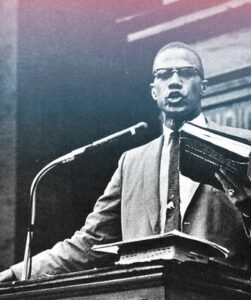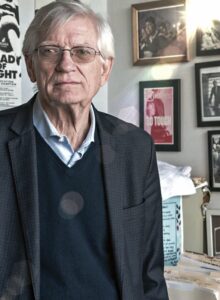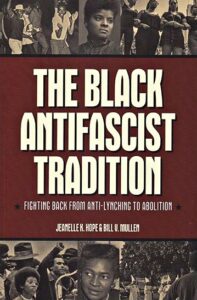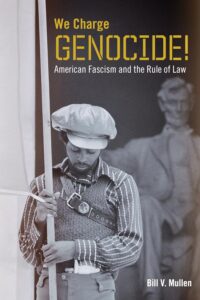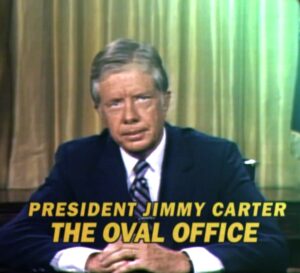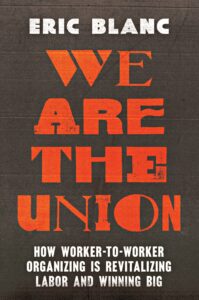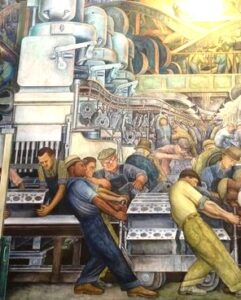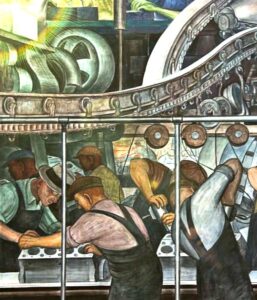Welcome to Law and Disorder Radio
Law and Disorder is a weekly independent civil liberties radio program airing on more than 150 stations and on Apple podcast. Law and Disorder provides timely legal perspectives on issues concerning civil liberties, privacy, right to dissent and practices of torture exercised by the US government and private corporations.
Law and Disorder January 20, 2025
Podcast: Play in new window | Download
Malcolm X Shabazz et al. v. USA
A groundbreaking legal case seeks justice for the family of most iconic civil rights leaders, Malcolm X. In an unprecedented lawsuit filed by his daughters, the Shabazz family is challenging the U.S. government, the City of New York, and several high-ranking law enforcement agencies. At the heart of the case is the claim that state actors, including the FBI and NYPD, played an active role in the assassination of Malcolm X on February 22, 1965, and that this involvement has been systematically covered up for decades.
This suit, Malcolm X Shabazz et al. v. USA, not only seeks justice for the wrongful death of Malcolm X but aims to hold the government accountable for its complicity in the assassination. The case draws on newly uncovered evidence that links federal agencies to the events surrounding Malcolm X’s death, as well as the subsequent framing and wrongful conviction of two men who were exonerated in 2021.
The legal team behind this case includes civil rights attorneys Benjamin Crump and G. Flint Taylor, and if successful, their argument could rewrite the historical narrative surrounding one of America’s tragic and significant moments. At the core of this case is the question: How deep was the state’s involvement in silencing Malcolm X? Was the assassination part of a coordinated campaign by law enforcement agencies determined to prevent the rise of powerful Black leaders? The lawsuit raises profound questions about the government’s role in suppressing movements for racial justice and civil rights, both in the past and in the present.
Guest – Flint Taylor of the Peoples Law Office. Flint represented the family of Fred Hampton and revealed that the FBI and Chicago Police Department murdered him in 1969. Flint is an editor of the Police Misconduct Law Reporter and is author of The Torture Machine: Racism And Police Violence In Chicago.
—-
A History Of Anti-Black Racism
National chauvinism and racism are essential features of fascism. The practice of white racism in the United States during the Jim Crow era was something that Hitler’s party in Germany studied and emulated. This kind of anti-black racism went on in the United States from shortly after the Civil War up until the 1960s. It has never really gone away as the mass mobilizations of the Black Lives Matter movement has recently demonstrated. This Black resistance, this fight back, will be a central aspect of anti-fascist activity in the future.
Guest – Bill Mullen is professor emeritus of American studies at Purdue University and the co-founder of The Campus Anti-fascist Network. He’s also co-author of The Black Antifascist Tradition and his new book published last month We Charge Genocide: American Ashes and the Rule of Law.
——————————
Law and Disorder January 13, 2025
Podcast: Play in new window | Download
Remembering The Legacy of Jimmy Carter
Jimmy Carter passed away on December 29, 2024, at the age of 100. His legacy in human rights has left an indelible mark on global diplomacy. Elected in 1977 as the 39th President of the United States, Carter made human rights a central theme of his administration. He believed that as a global power, the US had a responsibility to champion freedom, dignity, and justice for all people, regardless of nationality or political system. This vision led to the introduction of policies aimed at addressing both the internal injustices within the U.S. and the broader human rights violations occurring around the world.
One of Carter’s most significant achievements in this realm was his focus on condemning authoritarian regimes and promoting democratic movements. His administration applied pressure on governments, particularly in Latin America, Asia, and Africa, to uphold human rights standards, often linking U.S. foreign aid and diplomatic relations to a country’s record on human rights. Though controversial at times—especially in relation to U.S. alliances with regimes like those in Iran and Egypt—Carter’s commitment to human rights was revolutionary in its directness.
Beyond policy, Carter also helped create lasting institutions that would carry forward his vision. The Carter Center, founded in 1982, became a beacon for promoting democracy, advancing health, and improving human rights globally. Through the Center, Carter personally monitored elections, mediated peace talks, and worked to eliminate diseases that disproportionately affected the world’s most vulnerable populations. After leaving office, Carter’s work as a human rights advocate set a new precedent for U.S. foreign policy, showing that human rights can—and should—be a priority in shaping international relations and peace efforts.
Guest – Mischa Geracoulis is a journalist and critical media literacy expert. Mischa is the Curriculum Development Coordinator at Project Censored, and serves on the editorial board of the Censored Press and The Markaz Review. She writes about journalistic ethics and standards, press and academic freedoms, identity and culture, and the protracted disinformation campaign against the Armenian Genocide. She is author of the forthcoming book to be published by Routledge, Media Framing and the Destruction of Cultural Heritage.
—-
War Made Invisible: How America Hides the Human Toll of its Military Machine
The United States is engaged in constant, if often invisible, wars. Or, if not invisible, at least not accurately and fully reported on in the corporate media. Thereby leaving the people of the United States far from fully informed as to what and where U.S. military troops are stationed or engaged in military action. For example, while there has been a great deal of media coverage of the U.S. supported Israeli war in Palestine, one would have needed to pay extra close attention to that coverage to know that the U.S., even before that war began, had 40,000 U.S. troops stationed in the area. Or that the Biden Administration has just recently sent at least 1,500 more to join them. And how many of us know that late last year retired Israeli Major General Yitzhak Brick, said that, and I quote: “All of our missiles, the ammunition, the precision-guided bombs, all the airplanes and bombs, it’s all from the U.S. Everyone understands that we (Israel) can’t fight this war without the United States.
So last year, Norman Solomon, our guest today, wrote a much noted and much-admired book titled, War Made Invisible: How America Hides the Human Toll of its Military Machine. And that book has just been reissued with an up-dated afterword about the Gaza War, by the author. Naomi Klein, best-selling author of The Shock Doctrine, says the book is “A Staggeringly Important Intervention”. Noam Chomsky, says Solomon’s book is a “gripping and painful study of the mechanisms behind our invisible, but perpetual, national state of war.”
Guest – Norman Solomon is the co-founder of RootsAction.org and Executive Director of the Institute for Public Accuracy, and is, in fact, the author or co-author, of 12 books, most touching on today’s topic in either close or tangential ways. His books include War Made Easy: How Presidents and Pundits Keep Spinning Us to Death.
—————————
Law and Disorder January 6, 2024
Podcast: Play in new window | Download
We Are the Union: How Worker to Worker Organizing Is Revitalizing Labor and Winning Big.
The bank robber Willie Sutton was asked why he robbed banks. He famously replied, “because that’s where the money is.” We’re interested in the labor movement not only for humanitarian reasons but because that’s where the power is. Union members can withhold their labor and bring the economy to a standstill.
Unionized workers gained ground in 2024. Union workers in the private sector saw a 6% rise in real wages last year. But overall, the working class has not had an increase in their real wages in 50 years. The cost of rent, groceries, health care and other basic needs are becoming more and more out of reach, even for those working full-time jobs.
As Donald Trump takes office on January 20th, many are preparing for a real threat to our standard of living and democratic rights. After all, his cabinet includes architects of the controversial Project 2025 initiative – the conservative blueprint that the American Federation of State, County and Municipal Employees calls, “a radical attack on working people and their unions.” How will the battle for workers’ rights unfold this year and beyond?
Guest – Professor Blanc teaches Labor Studies and Employment Relations at Rutgers University, and he’s an organizer trainer in the Emergency Workplace Organizing Committee. He’s the author of Red State Revolt: the Teachers’ Strike Wave and Working-Class Politics, and his research has appeared in the Nation, the Guardian and Jacobin, among other publications. His latest book is We Are the Union: How Worker-to-Worker Organizing is Revitalizing Labor and Winning Big. Laborpolitics.com
—-
The Power Of Labor And A Workers’ Party
The forces of the gathering authoritarian storm in our country are evident in many ways. It is manifesting itself in powerful and continuing nationalism, in disdain for human rights, in the entwinement of government and religion, in a controlled mass media, in the protection of corporate power and the suppression of labor power and in the encouragement of violence.
The power of labor has been channeled into the Democratic and Republican Party, the twin parties of capitalism. We need a workers ‘ party, but we don’t even have the nucleus of one. Race and gender are formative in the building of authoritarian regimes. We see this in the United States. Haitians, who are Black, have been accused of eating cats and dogs. Women’s right to control their own bodies is under attack from the Supreme Court on down and women are marked as “childless cat ladies” and told to stay home and bear children.
Guest – Dianne Feeley is an editor of the magazine Against the Current. She is a leader of Solidarity, a socialist feminist organization. Dianne lives in Detroit where she has been an activist for many years in the United Automobile Workers union.
———————–
